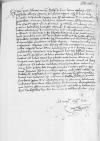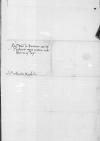[1] added in the other hand
[2] For a description of this audience see cf. Ioannes DANTISCUS to Sigismund I Jagiellon Valladolid, 1524-11-12, CIDTC IDL 5807⌊IDL 5807cf. Ioannes DANTISCUS to Sigismund I Jagiellon Valladolid, 1524-11-12, CIDTC IDL 5807⌋: Post longam demum sollicitationem meam in colloquium illius maiestatis X Octobris sum admissus, quod sic se habuit: dominus magnus cancellarius, ad Tordesillas vocatus hinc a maiestate caesarea, concesserat ob hanc, ut intellexi, audientiam. Quo cum pervenisset, scripsit mihi, ut ex inclusa copia ostenditur, quod maiestas caesarea gratum haberet adventum meum, quem hactenus ignorasset (si credere dignum est, cum toties comitem de Nassau, ipsum etiam magnum cancellarium atque alios officiales de habendo hospitio et per litteras et per nuntios meos hortatus fuissem). Perveni tandem, quemadmodum cancellarius in litteris suis voluit, pro tempore praefixo ad Tordesillas et illic ante portam nepotem domini cancellarii cum aliis quibusdam equitibus inveni, qui me exceperunt et ad diversorium cancellarii perduxerunt. Cumque cum illo per decursum fere unius horae consedissem et nuntios aliquoties ad caesarem, quando venire deberemus, misisset, data nobis fuit adeundi facultas. Et postquam foribus, ubi erat caesar, appropinquabamus, misit ad me illius maiestas bis, antequam fuissemus intromissi, ut ea, quae per me nomine Serenissimae Maiestatis Vestrae essent dicenda, in compendium redigerem, nam illius maiestas propter medicinas acceptas diu occupari non posset. Hoc etiam cancellarius me rogabat aliquoties. Data desuper fide introivi. Vidi caesarem stantem, pallidum, macerrimum, ut vix a me dinosci poterat. Statim me viso manum extendit. Deinde, postquam illius maiestatem nomine Maiestatis Vestrae Serenissimae salutassem, exhibui illi creditivas addens, si commissa mea audire posset, me illa, quanto brevius daretur, relaturum. Maiestas illius rogabat, ut cum magno cancellario omnia conferrem et illi singula exponerem, qui mihi desuper respondere et me tandem absolvere deberet. Germanice postea maiestatem illius allocutus rem totam legationis meae ex compendio illi rettuli et rogavi se in his omnibus, quemadmodum ipsa aequitas et mutua sanguinis necessitudo cum Maiestate Vestra Serenissima exposcit, exhiberet, et quod non crederet delatoribus, qui niterentur fortassis variis suis fabulis, quae passim in aula maiestatis suae feruntur, hunc mutuum amorem atque coniunctionem inficere. Respondit illius maiestas se numquam aliter sensisse de Maiestate Vestra Serenissima, quam de fratre et amico integerrimo et se nullis delationibus moveri, immo se semper Maiestati Vestrae Serenissimae et in his rebus a me expositis bonum fratrem et amicum exhibiturum. Et sic quasi venia petita, „Vorczeit mir” dicens se in conclave suum contulit. Non potui certe non condolere huic bono iuveni sic male hac aegritudine affecto. Inde rursus post prandium a magno cancellario in Valle Oleti confectis decem miliaribus nostris redii, nam locus ibidem non erat in diversorio. Rediit etiam die sequenti cancellarius, qui ea, quae maiestati caesareae exponere debui, in scriptis a me postulavit et accepit et se desuper cum aliis consiliariis ad hoc deputatis consulturum dixit.


 UUB, H. 154, f. 5v
UUB, H. 154, f. 5v